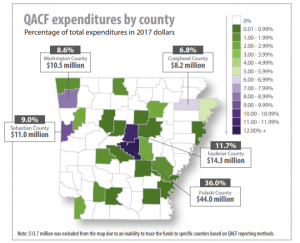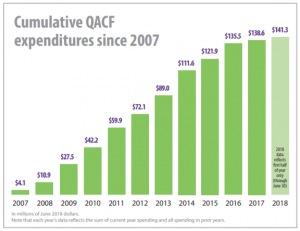By Caleb Taylor
A frequently used Arkansas business subsidy program largely fails to increase incomes or lower poverty rates over the long term, according to the latest research from two UCA academics.
ACRE-Affiliated Researcher and UCA Lecturer of Economics Jacob Bundrick and UCA Assistant Professor of Economics Dr. Weici Yuan’s researched the Quick Action Closing Fund (QACF) and wrote a paper titled “Do Targeted Business Subsidies Improve Income and Reduce Poverty? A Synthetic Control Approach.” It was published in Economic Development Quarterly on September 20th.
Bundrick and Yuan use evidence from Arkansas’s QACF to analyze how effective deal-closing funds are at increasing incomes and decreasing poverty at the county level. Their results indicate that the funds are ineffective at achieving these goals.
Created in 2007, the QACF allows the state to provide cash grants to select entities in the hopes of attracting and retaining businesses within Arkansas. From the start of the fund in 2007 to mid-2018, $185.7 million was appropriated to it. These subsidies are awarded to businesses primarily at the discretion of the governor.
Bundrick and Yuan conclude:
Our results coincide with the existing literature, indicating that QACF subsidies were largely ineffective at increasing per capita personal income and decreasing poverty rates in Arkansas’s counties. Few counties home to QACF projects experienced improvements in incomes and poverty rates relative to their counterfactuals. Moreover, the sparse improvements in treated counties generally proved to be temporary shocks rather than lasting improvements. Examining the average effects of the QACF also revealed that the subsidies did not create long-run improvements in per capita personal income and poverty rates. In general, our findings should caution policy makers who wish to improve incomes and poverty rates with targeted business subsidies.
This isn’t the first paper co-authored by Bundrick that questions the alleged benefits of the QACF. Bundrick and ACRE Scholar and UCA Associate Professor of Economics Dr. Thomas Snyder’s paper “Do Business Subsidies Lead to Increased Economic Activity? Evidence from Arkansas’s Quick Action Closing Fund” find that QACF subsidies provided to businesses within a given county have no statistically meaningful relationship with private employment per 1,000 population and private establishments per 1,000 population over a four-year period after the subsidies are disbursed.
Bundrick and Snyder concluded that the evidence provides reason to be skeptical of the QACF as a job creator. Their paper was published in the Review of Regional Studies in 2018 and first released by the Mercatus Center.
Targeted incentives are costly both when money is spent and when other opportunities are foregone. This funding could be used for other policies with better returns for Arkansans. Bundrick has repeatedly recommended policymakers prioritize more proven ways to improve economic growth through policies like tax reform, reducing barriers to job creation, and investing in education.
For more of ACRE researchers’ work on targeted economic development incentives, go here.
Bundrick’s latest publication, “Government Accountability – 5 Fixes for Arkansas’s Quick Action Closing Fund” is a policy review highlighting five ways Arkansas officials could improve the Quick Action Closing Fund.
For a summary of the costs of Arkansas’s Quick Action Closing Fund, go here.


